IMPLIKASI HUKUM HILANGNYA KEWENANGAN PENYIDIKAN DAN PENUNTUTAN PIMPINAN KOMISI PEMBERANTASAN KORUPSI
Abstract
The enactment of Law Number 19 of 2019 concerning the Second Amendment to Law Number 30 of 2002 was followed by various controversies, including changing the organizational structure of the Corruption Eradication Commission, then by eliminating the authority of the KPK leadership in terms of investigating and prosecuting as stated in Law Number 30 of 2002 in Article 21 paragraph (4), as well as paragraph (6) where the KPK leadership is no longer the highest person in charge of the anti-corruption agency. The authority for investigation and prosecution as well as the responsibilities of the KPK leadership must exist, where this is the main authority in eradicating corruption. Disclosure of corruption cases always begins with investigations, investigations, and prosecutions in terms of finding evidence and suspects as well as determining punishments to ensnare the perpetrators of corruption. Meanwhile, the authority for investigation and prosecution as well as the responsibilities of the KPK leadership are still needed so that the KPK leadership can directly order investigators and public prosecutors who previously came from the Police and Prosecutors' agencies so that efforts to eradicate and prevent corruption can run well. The problem that can be raised is how to regulate the authority of the KPK leadership in investigation and prosecution, then what are the legal implications of the loss of authority to investigate and prosecute KPK leaders. Using normative legal research methods through statutory approaches and conceptual approaches, with prescriptive analysis techniques. The loss of authority and responsibility of the KPK leadership as investigators and public prosecutors can have implications for the loss of effective control of the KPK leadership in investigations and prosecutions. Then it can slow down efforts to eradicate corruption because the control of eradicating corruption is no longer directly with the KPK leadership or it can even stop the investigation and prosecution process. The Supervisory Board has a higher position than the KPK leadership, then the Supervisory Board is also given broader duties and authority from the KPK leadership related to law enforcement even though in carrying out the duties of the KPK institution it is the KPK leadership, but the authority and responsibility of the KPK leadership have turned to the Supervisory Board.
Downloads
References
Azheri, Busyra, Corporate Social Responsibility Dari Voluntary Menjadi Mandotary (Jakarta: Raja Grafindo Perss, 2011)
Fathiyatul, Neny Hikmah, ‘Keberadaan Dewan Pengawas Terhadap Independensi Komisi Pemberantasan Korupsi Perspektif Siyasah Dusturiyah’, Al-Balad: Journal of Constitutional Law, 2.2 (2020) <http://urj.uin-malang.ac.id/index.php/albalad/article/view/595>
Iskandar, Bakri, ‘Analisis Putusan Mahkamah Konstitusi No. 36/PUU-XV/2017 Tentang Hak Angket Dewan Perwakilan Rakyat Terhadap Komisi Pemberantasan Korupsi’, Jurnal Lex Renaissance, 4.2 (2019) <https://doi.org/10.20885/JLR.vol4.iss2.art12>
Kansil, CST, Kamus Istilah Hukum (Jakarta, 2009)
Kompastv, Youtube, ‘Revisi UU KPK Disahkan, Bagaimana Masa Depam Pemberantasan Korupsi’, Youtube Kompastv <https://youtu.be/L7nwF3vBmXE> [accessed 5 October 2021]
Lumentah, Charlie, ‘PENGAWASAN TERHADAP PENEGAK HUKUM DALAM PENANGANAN PERKARA TINDAK PIDANA KORUPSI’, LEX CRIMEN, 3.1 (2014) <https://ejournal.unsrat.ac.id/index.php/lexcrimen/article/view/3846>
Mukhlis, ‘Pergeseran Kedudukan Dan Tugas Penyidik POLRI Dengan Perkembangan Delik-Delik Di Luar KUHP’, Jurnal Ilmu Hukum, 3.1 (2012) <https://media.neliti.com/media/publications/9142-ID-pergeseran-kedudukan-dan-tugas-penyidik-polri-dengan-perkembangan-delik-delik-di.pdf>
Putri, Cicik Nawang, Helmi Alwi, and Budi Suharto, ‘Bersekongkol Membubarkan Komisi Pemberantasan Korupsi’, ’ADALAH, 4.3 (2020) <https://doi.org/10.15408/adalah.v4i3.16271>
Rato, Dominikus, Filsafat Hukum Mencari: Memahami Dan Memahami Hukum (Yogyakarta: Laksbang Pressindo, 2010)
Rishan, Idul, ‘Ketika KPK Di Bawah Kuasa Presiden’, Law.Uii.Ac.Id, 2019 <https://law.uii.ac.id/blog/2019/11/12/ketika-kpk-di-bawah-kuasa-presiden/> [accessed 5 October 2021]
Saleh, Imam Anshori, Konsep Pengawasan Kehakiman, Cetakan Pe (Malang: Setara Press, 2014)
Sosiawan, Ulang Mangun, ‘Peran Komisi Pemberantasan Korupsi (KPK) Dalam Pencegahan Dan Pemberantasan Korupsi’, Jurnal Penelitian Hukum De Jure, 19.4 (2019), 517 <https://doi.org/10.30641/dejure.2019.V19.517-538>
Suntoro, Agus, ‘PENYADAPAN DAN EKSISTENSI DEWAN PENGAWAS KOMISI TINDAK PIDANA KORUPSI’, Jurnal Legislasi Indonesia, 17.1 (2020), 25 <https://doi.org/10.54629/jli.v17i1.627>
Umar, Olivia, ‘EKSISTENSI DEWAN PENGAWAS KOMISI PEMBERANTASAN KORUPSI MENURUT UNDANG-UNDANG NOMOR 19 TAHUN 2019 TENTANG PERUBAHA KEDUA ATAS UNDANG-UNDANG NOMOR 30 TAHUN 2002’, Dinamika Jurnal Ilmu Hukum, 26.14 (2020) <http://riset.unisma.ac.id/index.php/jdh/article/view/7123>
Wahyuningrum, Kartika Sasi, Hari Sutra Disemadi, and Nyoman Serikat Putra Jaya, ‘INDEPENDENSI KOMISI PEMBERANTASAN KORUPSI: BENARKAH ADA?’, Refleksi Hukum: Jurnal Ilmu Hukum, 4.2 (2020), 239–58 <https://doi.org/10.24246/jrh.2020.v4.i2.p239-258>
Wijaya, Happy Trizna, ‘TINJUAN YURIDIS TERHADAP KEDUDUKAN KPK DAN KEJAKSAAN SEBAGAI LEMBAGA INDEPENDEN DALAM PERSPEKTIF HUKUM TATA NEGARA’, Jurnal Pro Hukum : Jurnal Penelitian Bidang Hukum Universitas Gresik, 10.1 (2021), 25–30 <https://doi.org/10.55129/jph.v10i1.1432>
YUSRIL, MUHAMMADY USUF, ‘KEWENANGAN DEWAN PENGAWAS KOMISI PEMBERANTASAN TINDAK PIDANA KORUPSI (KPK) DALAM PEMBERIAN IZIN PENYADAPAN, PENGGELEDAHAN, DAN/ATAU PENYITAAN’ (Universitas Hasanuddin, 2020) <http://repository.unhas.ac.id/id/eprint/2429/>
Authors who publish with Mimbar Keadilan agree to the following terms:
- Authors transfer the copyright and grant the journal right of first publication with the work simultaneously licensed under a Creative Commons Attribution-ShareAlike 4.0 International License.. that allows others to share the work with an acknowledgement of the work's authorship and initial publication in this journal.
- Authors are able to enter into separate, additional contractual arrangements for the non-exclusive distribution of the journal's published version of the work (e.g., post it to an institutional repository or publish it in a book), with an acknowledgement of its initial publication in this journal.
- Authors are permitted and encouraged to post their work online (e.g., in institutional repositories or on their website) prior to and during the submission process, as it can lead to productive exchanges, as well as earlier and greater citation of published work (See The Effect of Open Access)






